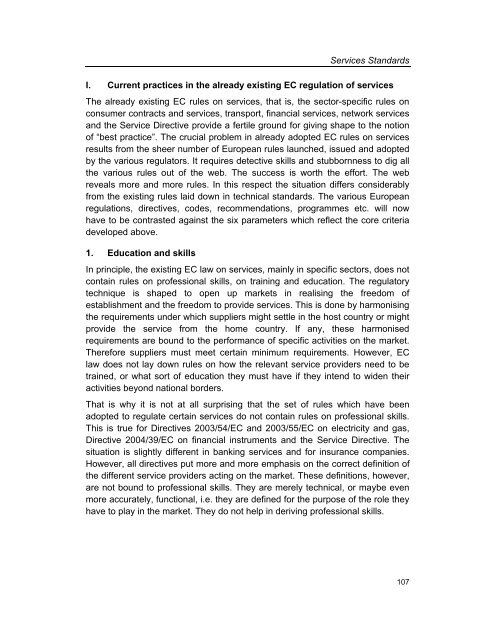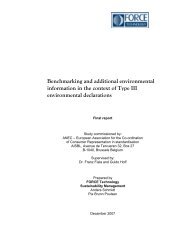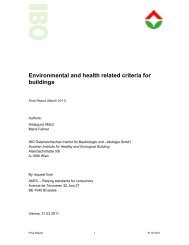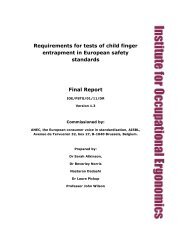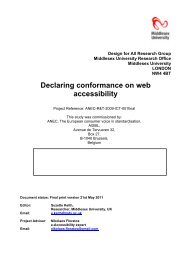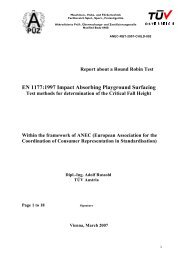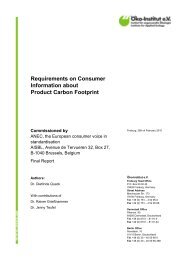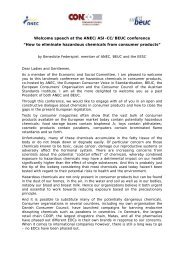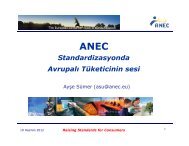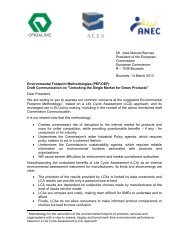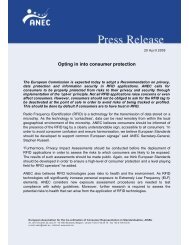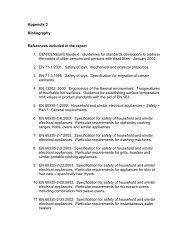Services Standards: Defining the Core Consumer Elements ... - ANEC
Services Standards: Defining the Core Consumer Elements ... - ANEC
Services Standards: Defining the Core Consumer Elements ... - ANEC
Create successful ePaper yourself
Turn your PDF publications into a flip-book with our unique Google optimized e-Paper software.
<strong>Services</strong> <strong>Standards</strong><br />
I. Current practices in <strong>the</strong> already existing EC regulation of services<br />
The already existing EC rules on services, that is, <strong>the</strong> sector-specific rules on<br />
consumer contracts and services, transport, financial services, network services<br />
and <strong>the</strong> Service Directive provide a fertile ground for giving shape to <strong>the</strong> notion<br />
of “best practice”. The crucial problem in already adopted EC rules on services<br />
results from <strong>the</strong> sheer number of European rules launched, issued and adopted<br />
by <strong>the</strong> various regulators. It requires detective skills and stubbornness to dig all<br />
<strong>the</strong> various rules out of <strong>the</strong> web. The success is worth <strong>the</strong> effort. The web<br />
reveals more and more rules. In this respect <strong>the</strong> situation differs considerably<br />
from <strong>the</strong> existing rules laid down in technical standards. The various European<br />
regulations, directives, codes, recommendations, programmes etc. will now<br />
have to be contrasted against <strong>the</strong> six parameters which reflect <strong>the</strong> core criteria<br />
developed above.<br />
1. Education and skills<br />
In principle, <strong>the</strong> existing EC law on services, mainly in specific sectors, does not<br />
contain rules on professional skills, on training and education. The regulatory<br />
technique is shaped to open up markets in realising <strong>the</strong> freedom of<br />
establishment and <strong>the</strong> freedom to provide services. This is done by harmonising<br />
<strong>the</strong> requirements under which suppliers might settle in <strong>the</strong> host country or might<br />
provide <strong>the</strong> service from <strong>the</strong> home country. If any, <strong>the</strong>se harmonised<br />
requirements are bound to <strong>the</strong> performance of specific activities on <strong>the</strong> market.<br />
Therefore suppliers must meet certain minimum requirements. However, EC<br />
law does not lay down rules on how <strong>the</strong> relevant service providers need to be<br />
trained, or what sort of education <strong>the</strong>y must have if <strong>the</strong>y intend to widen <strong>the</strong>ir<br />
activities beyond national borders.<br />
That is why it is not at all surprising that <strong>the</strong> set of rules which have been<br />
adopted to regulate certain services do not contain rules on professional skills.<br />
This is true for Directives 2003/54/EC and 2003/55/EC on electricity and gas,<br />
Directive 2004/39/EC on financial instruments and <strong>the</strong> Service Directive. The<br />
situation is slightly different in banking services and for insurance companies.<br />
However, all directives put more and more emphasis on <strong>the</strong> correct definition of<br />
<strong>the</strong> different service providers acting on <strong>the</strong> market. These definitions, however,<br />
are not bound to professional skills. They are merely technical, or maybe even<br />
more accurately, functional, i.e. <strong>the</strong>y are defined for <strong>the</strong> purpose of <strong>the</strong> role <strong>the</strong>y<br />
have to play in <strong>the</strong> market. They do not help in deriving professional skills.<br />
107


